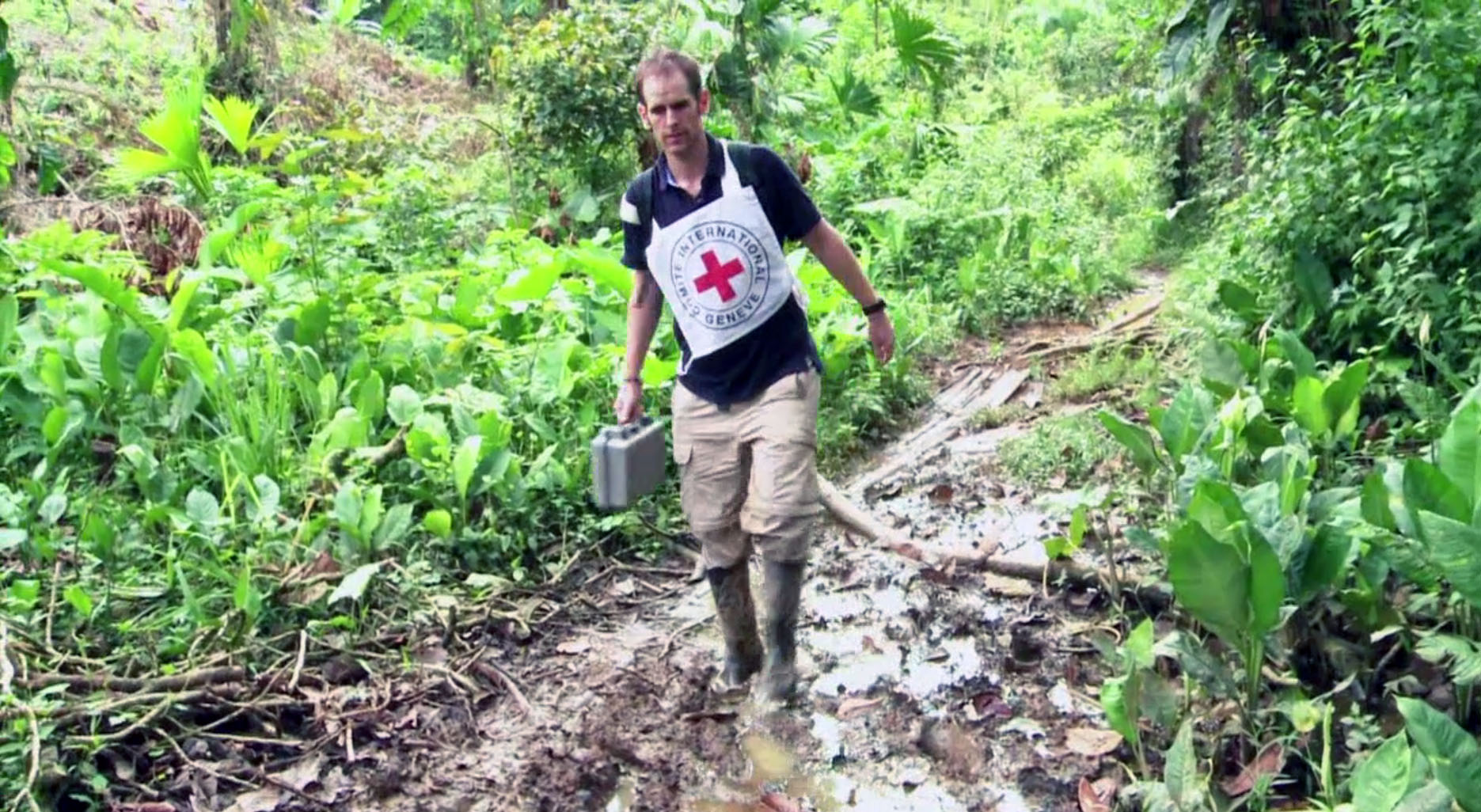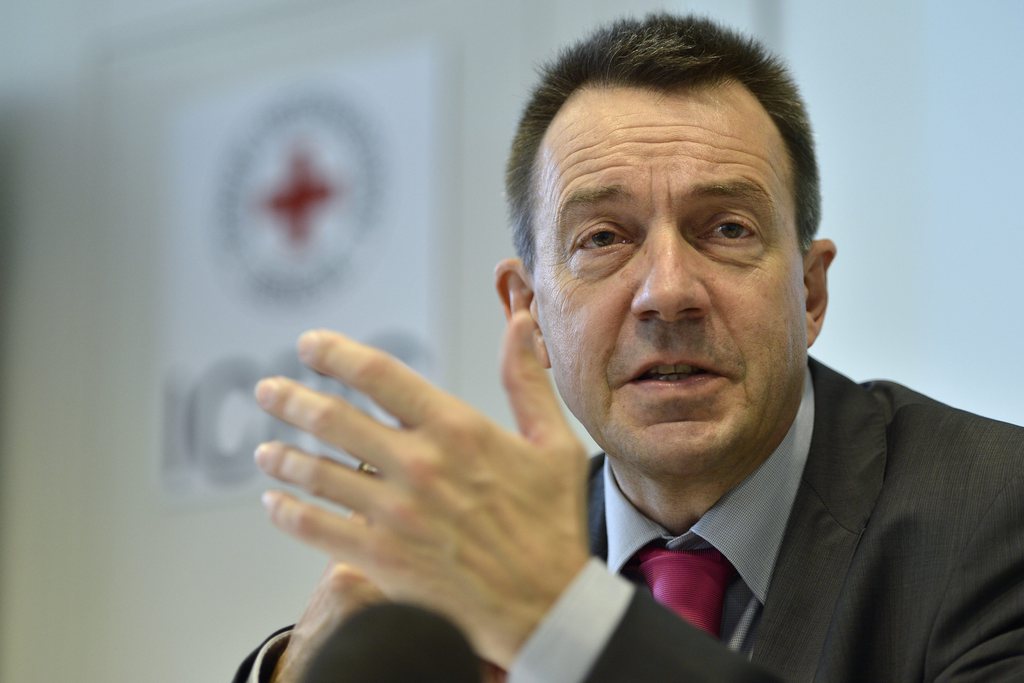Conflicts are ‘evolving into new forms’

The head of the International Committee of the Red Cross (ICRC), Peter Maurer, is trying to make the organisation more transparent. In an interview with swissinfo.ch, he talks about the challenges of working in the Central African Republic and Syria.
swissinfo.ch caught up with him at the ICRC’s Geneva headquarters after a gruelling tour of field operations and meetings in Syria, Iraq, South Sudan and the Central African Republic since January.
Last year was the 150th anniversary of the ICRC. In 2014 it is celebrating another birthday – the 150th anniversary of the signing of the First Geneva Convention, the starting point for all international humanitarian law.
Peter Maurer was born in Thun, Switzerland, in 1956. He studied history and international law in Bern and was awarded a PhD.
He entered the Swiss diplomatic service in 1987, holding different positions in Bern and Pretoria in South Africa before being transferred to New York as deputy permanent observer to the Swiss mission to the United Nations. He later became ambassador there.
In 2010 he became Switzerland’s state secretary for foreign affairs, a position he held before being appointed ICRC president on July 1, 2012.
swissinfo.ch: You are just back from the Central African Republic, where the situation is dire. What are the priorities?
Peter Maurer: There are a lot of things that need to happen that are not in ICRC’s core mandate and we encourage other actors to engage. Beefing up international security presence is one of them. In a country where there is currently no functioning army or police, security has to be provided by a credible international presence. I would certainly welcome countries within the UN framework to agree on a credible operation that could beef up the contribution from African-led and French peacekeepers.
We need more credible disarmament efforts. There is not much going on at the moment. From the ICRC side we also need more engagement on rule of law and the justice system.
At the core of everything missing in the Central African Republic is a credible and inclusive political process that would give confidence to the international community to invest in all these stabilisation efforts.
At the moment we are completely in substitution mode: there are almost no state structures providing health, water or sanitation; tens of thousands of people are displaced across the country.
swissinfo.ch: What changes has the ICRC witnessed since the unanimous UN Security Council resolution from February 22 demanding rapid, safe and unhindered aid access in Syria, including across borders?
P.M.: The general dynamic hasn’t changed despite the diplomatic efforts and UN Security Council resolution. The overall pattern is still difficult, with challenging access and escalating needs, displacements and humanitarian concerns.
There is no proof that violence has increased or decreased. But military operations continue, people continue to be displaced and become trapped between fronts. Access to these people is very challenging. The needs are large and possibilities to respond are just drops in the ocean.
I recognize that there are some areas of progress. Since January we have had some cross-line operations into besieged areas, we had a meaningful convoy into Barzeh, we got some visas into important regions that have allowed us to work not only out of Damascus and Aleppo but to also have an ICRC presence in Homs, Hama and Tartous. There are some steps forward and positive developments – we are assisting more people today than two months ago – but the problem is that needs are growing at least as fast if not faster and therefore the gap remains extremely challenging.
swissinfo.ch: During your two years as head of the ICRC you have sought to install a new management style, asking people to call you ‘Peter, rather than president’. Why?
P.M.: I don’t have a fixed idea on leadership. I am who I am. I was chosen to lead this organisation and I don’t want to be fundamentally different from how I am. Otherwise you are not a credible president or leader.
I think we are living in a time where more fluid interactions between the governance and the management of the organisation – not just this one but in the broader environment – are important. We need agile organisations that are dynamically evolving around their respective roles and decision-making processes. This is what is behind a more collegial way of engagement. This suits me as a person and it’s topical for the organisation at the same time.
Big step: I'm on Twitter. Follow for tweets about today's #humanitarianExternal link challenges and @ICRCExternal link's work around the world.
— Peter Maurer (@PMaurerICRC) April 4, 2014External linkswissinfo.ch: Greater transparency also appears to be a new goal as suggested by your new Twitter account and the new behind-the-scenes documentary series following ICRC delegates in the field.
P.M.: During its history the ICRC’s identity has been strongly influenced by confidentiality. We need to be committed to working confidentially when necessary. But we also have to revisit the way it is applied in an organisation. When I joined the ICRC, what I found was that a lot of things considered confidential I personally didn’t find confidential at all.
It’s not about transparency and openness as an opposite to confidentiality but as a reasonable complement.
There are good reasons to be more transparent on many issues we are talking about, being more assertive and open about our doubts and the questions we ask ourselves. We shouldn’t have the ambition to work among ourselves in a dark room and present the world with a solution. That’s not the world we are living in any more. We are living in an international humanitarian system where others are thinking as well so we have to be part of that thought process and find our role. This needs engagement, partnerships and transparency as well as activities that at certain times and in certain contexts are out of the limelight and where we can work quietly.

More
ICRC delegates at work
swissinfo.ch: Last year was the 150th anniversary of the ICRC. In an interview you said “Rather than an occasion for self-congratulation, the anniversary should be a time for future-oriented reflection and rededication.” What new ideas have you taken from this important year?
P.M.: A lot of the core elements of ICRC’s approach over the last 150 years remain very true and topical: an organisation that combines assistance, protection, law development with field work, being close to victims and engaging with all actors. These are all operational principles, as well as our neutral, impartial and independent template, that remain valid every day.
But we live in a period where we see conflict evolving into new forms, with new types of actors and weapons. The humanitarian environment is also changing. We are not the only ones providing humanitarian assistance and protection.
During the 2015–2018 period we will try to respond by marrying tradition with the new environment. We will certainly continue to put a strong accent on our protection mandate and properly define our partnerships – what they mean and where there are limits. We will also tackle new developments in violence, weaponry and actors. This needs some new thinking as there is no ready-made recipe to addressing these new challenges.
swissinfo.ch: 2014 is another anniversary – the 150th since the signing of the First Geneva Convention. But when you look at conflicts like Syria, South Sudan and Central African Republic, where hospitals and staff treating the wounded are regularly attacked and the injured are denied treatment, hasn’t such a legal tool just become irrelevant?
P.M.: This doesn’t mean the law is not relevant – it just means that the challenges continue. It just shows that we have a difficult adequacy between the reality of the battlefield and the law. There is no question that these are good norms.
It shows that we have to find new ways of addressing actors and perpetrators and situations to make the law more respected. But this is an implementation issue and not an issue of relevance of the law. It may well be that ICRC and many others have at times underestimated the time, energy and effort that goes into explaining what the law means concretely.
The principles are good but the present situation only underlines that we need to redouble our efforts to make them understood and respected.

In compliance with the JTI standards
More: SWI swissinfo.ch certified by the Journalism Trust Initiative












You can find an overview of ongoing debates with our journalists here . Please join us!
If you want to start a conversation about a topic raised in this article or want to report factual errors, email us at english@swissinfo.ch.